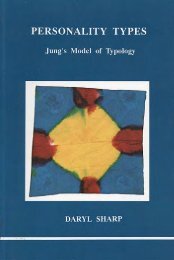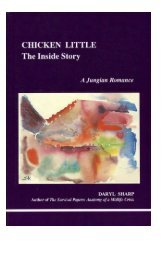Digesting Jung: Food for the Journey - Inner City Books
Digesting Jung: Food for the Journey - Inner City Books
Digesting Jung: Food for the Journey - Inner City Books
Create successful ePaper yourself
Turn your PDF publications into a flip-book with our unique Google optimized e-Paper software.
10 It’s a Complex Life<br />
“Head”— “bed” (0.8 sec.)<br />
“Marry”— “toge<strong>the</strong>r” (1.7 sec.)<br />
“Woman”— “friend” (2 sec.)<br />
“Home”—(long pause) “none” (5.6 sec.)<br />
—and so on.<br />
Then <strong>the</strong> examiner takes you through <strong>the</strong> list a second time, noting<br />
different responses to <strong>the</strong> same words. Finally you are asked <strong>for</strong><br />
comments on those words to which you had a longer-than-average<br />
response time, a merely mechanical response or a different association<br />
on <strong>the</strong> second run-through. All <strong>the</strong>se had been flagged by <strong>the</strong><br />
examiner as “complex indicators.”<br />
My experience of <strong>the</strong> Word Association Experiment was both<br />
illuminating and deflating. It convinced me that complexes were<br />
not only real but were alive in me and quite autonomous, independent<br />
of my will. I realized <strong>the</strong>y could affect my memory, my<br />
thoughts, my moods, my behavior. I was not free to be me—<strong>the</strong>re<br />
was no “me”—when I was in <strong>the</strong> grip of a complex.<br />
Freud described dreams as <strong>the</strong> via regia to <strong>the</strong> unconscious; <strong>Jung</strong><br />
showed that <strong>the</strong> royal road to <strong>the</strong> unconscious is ra<strong>the</strong>r <strong>the</strong> complex,<br />
<strong>the</strong> architect of both dreams and symptoms. In fact, <strong>Jung</strong> originally<br />
gave <strong>the</strong> name “complex psychology” to his school of thought, to<br />
distinguish it from Freud’s school of psychoanalysis.<br />
The activation of a complex is always marked by <strong>the</strong> presence of<br />
some strong emotion, be it love or hate, joy or anger, or any o<strong>the</strong>r.<br />
We are all complexed by something, which is to say, we all react<br />
emotionally when <strong>the</strong> right buttons are pushed. Or, to put it ano<strong>the</strong>r<br />
way, an emotional reaction means that a complex has been constellated.<br />
When a complex is activated we can’t think straight and<br />
hardly know how we feel. We speak and act according to <strong>the</strong> dictates<br />
of <strong>the</strong> complex, and when it has run its course we wonder<br />
what took over.<br />
We cannot get rid of our complexes, simply because <strong>the</strong>y are<br />
deeply rooted in our personal history. Complexes are part and parcel<br />
of who we are. The most we can do is become aware of how we










